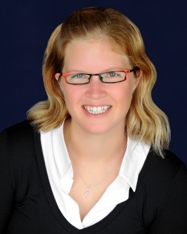Research Awards
Melissa Bowerman
Winner of the Dr. Ronald G. Worton Researcher in Training Award (2010)
at the Ottawa Hospital Research Institute
Winner of the Dr. Ronald G. Worton Researcher in Training Award (2010)
at the Ottawa Hospital Research Institute
 Melissa Bowerman was always interested in answering big questions about how the body works and how disease develops, but when she started working as a summer student at the Ottawa Hospital Research Institute (OHRI) she tried not to set her expectations too high. She knew that scientific progress can take a long time, so she took satisfaction in the small successes and kept working with patience and persistence.
Melissa Bowerman was always interested in answering big questions about how the body works and how disease develops, but when she started working as a summer student at the Ottawa Hospital Research Institute (OHRI) she tried not to set her expectations too high. She knew that scientific progress can take a long time, so she took satisfaction in the small successes and kept working with patience and persistence.In Melissa's case, however, one small success led to another, and after six years it is clear that she has made a major breakthrough in the fight against Spinal muscular atrophy (SMA), the leading inherited cause of death in infants and toddlers.
As a PhD student in Dr. Rashmi Kothary's laboratory, Melissa's goal was to investigate the gene that is known to be mutated in people with SMA. Although SMA is primarily thought of as a muscle disease, Melissa's project was to look at the role of the SMA gene in the nerve cells that connect to muscles and control their movement. Using cell culture models, she found that the SMA gene plays a crucial role in nerve cells by helping them maintain an internal scaffold, which gives them a rigid shape. Without the SMA gene, nerve cells lose their rigid shape, and their connection to muscle cells becomes so weak that eventually both the muscle and nerve cells die.
Over the course of these studies, Melissa started working with a laboratory compound called Y-27632, which was known to affect the cell scaffold. She found that this compound, which had been developed more than 20 years ago, could help nerve cells with SMA gain back some of their normal properties. Amazingly, it also allowed mice with a certain form of SMA to survive well into adulthood; representing the greatest increase in survival ever seen with an experimental SMA therapy. Melissa is now working to see if Y-27632 or a similar compound might be suitable for testing in humans. While this research is still in the laboratory phase and there is much to be done, experts in the field have called her work among the most important contributions to SMA research in the last decade.
Remarkably, Melissa has accomplished all this while playing and coaching competitive basketball, and more recently, starting a family. She has also mentored a number of younger students in the laboratory, won numerous awards, presented at several international conferences and published five original research papers.
If Melissa's experiments continue to go well, she hopes to graduate from the University of Ottawa with a PhD in Cellular and Molecular Medicine in the next year of so. She'll have a great start towards an independent research career, but she'll continue to take things one step at a time.
